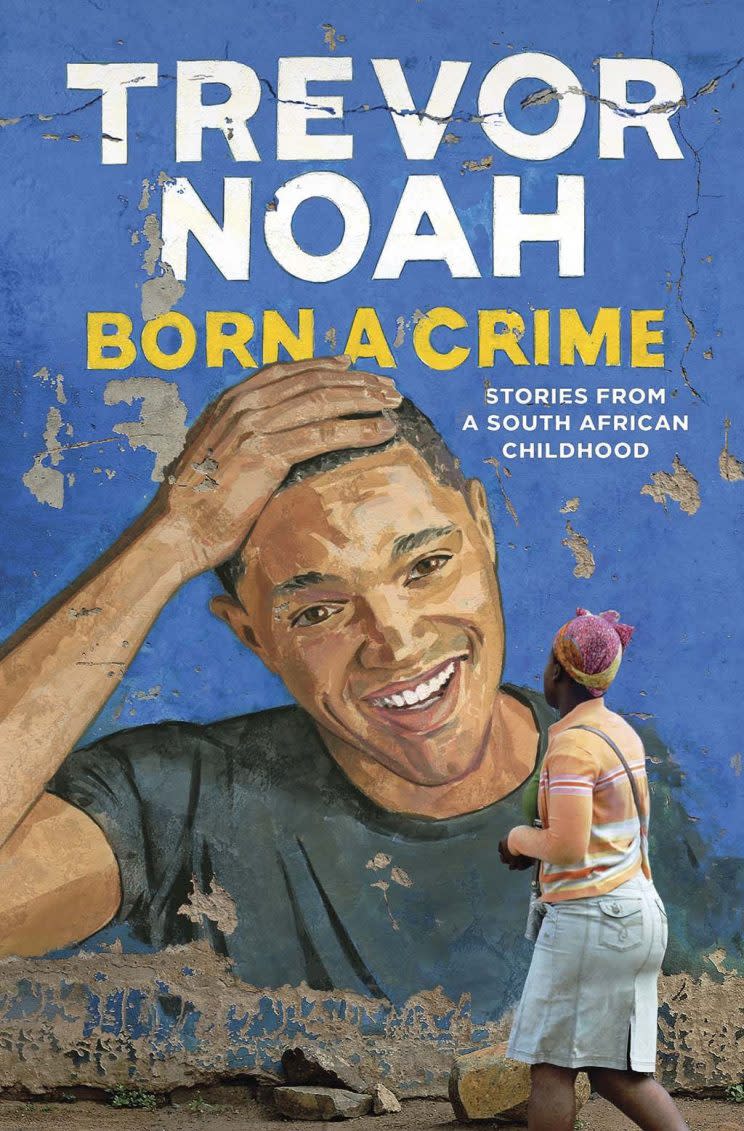Trevor Noah on His New Memoir and What’s Next for ‘The Daily Show’

Trevor Noah’s book is nothing like the usual celebrity collection of essays, even though his wry comic voice, familiar from The Daily Show, is easily recognizable. In the eye-opening Born a Crime, he writes about growing up in South Africa under apartheid. His mother is black, his father white, and his very existence evidence of racial mixing that was then illegal.
Noah was 6 when the laws began to loosen, and 10 when democracy arrived, in 1994. With a droll sense of absurdity, he recalls his boyhood. While visiting his grandmother in Soweto, he was forbidden to leave the yard; she feared, with good reason, that as a conspicuously mixed-race child he might have been snatched by the authorities and sent to an orphanage. His fiercely independent mother emerges as the book’s heroine. She raised him on her own, although Trevor spent Sunday afternoons with his dad. His mother later endured an abusive marriage to a man who shot her in the face.
Related: Fall Reading List: 16 TV-Themed Books
The book ends as Noah’s career in standup is beginning. It doesn’t address The Daily Show, which he took over from Jon Stewart last year. Reviews and ratings were — and still are — underwhelming, but the audience is growing, and the show does well in its most desirable demographic, young men. Yahoo TV talked to Noah the day before the presidential election; like most late-night hosts, he now seems shocked at Donald Trump’s victory. He brings a unique experience of race to the conversation.
One startling thing about the book is that most of us don’t imagine that somebody who is 32 years old would have grown up under apartheid. It seems so far away.
It really does. It’s one of those stories in time where you feel like it happened ages ago and then you realize — no, it just happened now.
When you first moved to the U.S. in 2011, what was the biggest difference you saw in race relations here?
The biggest difference I saw was how below the surface it was. Obviously now in just the space of a year through the Trump campaign, we’ve seen an explosion. But I was shocked by people using code words and innuendo when speaking about race or trying to imply racism. It was a really interesting dynamic I’ve never experienced before. In South Africa, we come from such a blatant place both in terms of policy and people that there was no one who was denying it and no one who tried to hide what it was.
Did that change start happening before this past year, or is it all about the Trump campaign, do you think?
Look, we’ve always known racism has been around. But you cannot deny that in the last year alone, we have seen an explosion. Just the brazen nature with which people express their racism now, it’s quite a thing. Not just Trump supporters. I’m talking about governors or mayors. And you’re like — how is this allowed? But you realize when you’re in a world where the person who is way closer than they should be to being the president of the United States says it, then why would anyone who’s below that position feel they have to hide the fact that they are racist?
Your mother has an incredible sense of humor. You write about how she was meant to bow down to her husband at the time, and she bowed so low that she was making fun of the gesture. You describe her approach as “Don’t fight the system, mock the system.” Is that what you’re doing on The Daily Show?
I believe that’s the role of any comedian or any commentator in the world of satire. You are mocking the system, and you use that mockery to poke holes in the fallacies and the lack of logic. Laughter is a very undermining thing. When something is laughed at, it does not maintain the same status it may have possessed before.
Did you inherit your mother’s sense of humor?
Definitely. I inherited my mother’s sense of humor in terms of her physicality and her boisterousness and her silliness. But I also inherited my father’s dry sense of humor, so I do have a mix. It depends on which day you meet me, and it depends on what I’m feeling like. Some people only know me as a fairly dry comedian and sarcastic. Some people think of me as being all about impersonating and being physical. And my grandfather was a big storyteller. All those people influenced how I see humor.

In one funny, outrageous section, you write about your friend as a teenager, whose first name was Hitler. You explain that is not an unusual name in South Africa. You DJ’d with a dance group and Hitler was the star. You truly did not understand why performing and chanting “Go Hitler” in a school auditorium full of Jewish kids got you thrown out. How did you go from there to doing pointed political satire today?
I think it was traveling the world and existing beyond my bubble. In the U.S. people use the word “Hitler” for everything. They’ll say, “You’re a grammar Nazi” and “You’re a soup Nazi.” We don’t say that. I grew up with Jewish kids, I knew who Hitler was, but it’s a name. Growing up in South Africa we had many people named after the fathers of apartheid. We hated the people for what they had done, but it wasn’t the name that made them do it. The U.K. was the first place where I had an experience. Because of their history they have a deep connection to World War II, and every British comedian has a joke about Hitler. So when I traveled there, I begin to realize — oh, wow.
What part of the book was the most difficult to write or the most painful to look back on?
It was definitely the stories of growing up in a household of violence. A lot of the time we try to get over issues as quickly as possible, and writing a book forces you to live in those moments way longer than you would like. Having to talk about my mother being abused and shot — those are not easy things to get through even if you’ve gone over them many times in your head.
The Daily Show ratings have been going up, and October was your best month so far. What are your plans postelection to try to keep that momentum?
I’m hoping that I’ll be able to expand the variety of the show in terms of talking about more international stories, and have conversations about social issues beyond war, politics, and policy. And I think in time, we will grow with the audience. That’s really what a daily show is about. It doesn’t matter which show you are on, whether it’s Ellen or Kimmel. You’re building a relationship every single day.
What are some of the social concerns you’d like to explore?
Something around education, for instance. I’m a huge believer that education is one of the biggest reasons we have a lot of issues in society, everything from domestic abuse to injustice in general. Look at voting. The way a lot of people vote is divided along the lines of how they’re educated. It’s tough to have conversations where you see eye‑to‑eye when one group is seeing things through the lens of being uneducated or misinformed. If we’re all informed, there is a good chance we will all be trying to get to the same place. But now we’re living in a world where some people don’t even believe that global warming is a real thing. There’s people who don’t even know that slavery was that bad.
How have you have changed and made adjustments in the time you’ve been doing the show?
I’ve gotten more and more confident in the idea that I am going to share my point of view. I don’t exist in a space of knowing; I exist in a space of wanting to know. That’s how I approach life. I think initially I was afraid to embrace that, because you’re seeing Jon Stewart and everyone’s telling you how this guy was the most trusted man in America, and you’re taking that position. Everyone’s saying to you, “Hey, how are you going to have that levity?” Then you realize you can’t have it. That is something that’s built over time. Once I realized that I was, like — just be truthful to yourself and go with it. I’m not here because I have the answers. I’m here because I like to ask the questions and I believe that I can ask the right questions. If you can exist as always trying to learn, that’s where you experience the most growth.
Born a Crime: Stories from a South African Childhood goes on sale Tuesday, Nov. 15. The Daily Show airs weeknights at 11 p.m. on Comedy Central.

